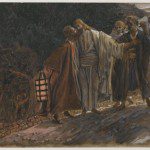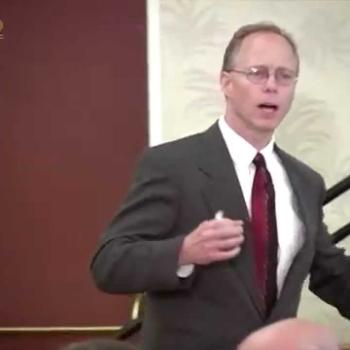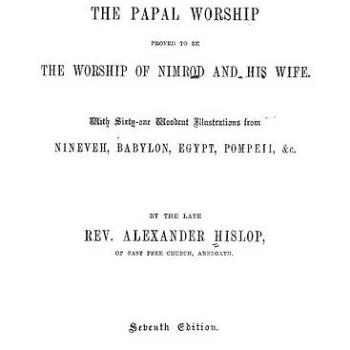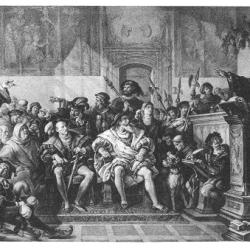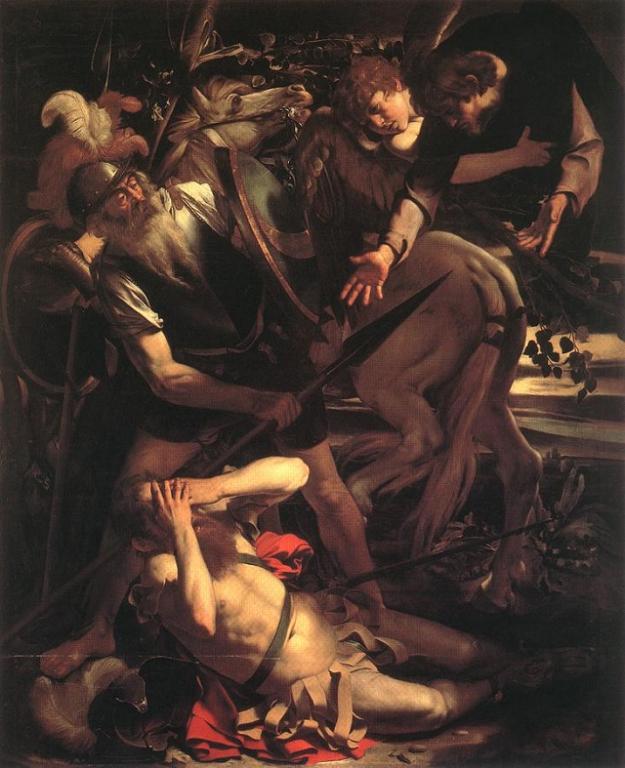
The Conversion of St. Paul (1600), by Caravaggio (1571-1610) [public domain / Wikimedia Commons]
***
Joshua Scott is a Protestant who responded to my challenge to interact point-by-point with one of my articles. He chose to wrangle with the section on the Jerusalem council from my book, The Catholic Verses (2004), and some additional material in an older paper on this topic. His words will be in blue. My words from the book will be in green, and my present counter-replies in regular black.
***
In the Jerusalem Council (Acts 15:6-30), we see Peter and James speaking with authority. This Council makes an authoritative pronouncement (citing the Holy Spirit) which was binding on all Christians:
Acts 15:28-29: For it has seemed good to the Holy Spirit and to us to lay upon you no greater burden than these necessary things: that you abstain from what has been sacrificed to idols and from blood and from what is strangled and from unchastity. In the next chapter, we read that Paul, Timothy, and Silas were traveling around “through the cities,” and Scripture says that:
. . . they delivered to them for observance the decisions which had been reached by the apostles and elders who were at Jerusalem. (Acts 16:4)
This is Church authority. They simply proclaimed the decree as true and binding — with the sanction of the Holy Spirit Himself! Thus we see in the Bible an instance of the gift of infallibility that the Catholic Church claims for itself when it assembles in a council.
Well, it’s Apostolic authority certainly, but to conflate Apostolic authority with conciliar/church authority requires more than an ipse dixit. The Apostles were, by any Biblical standard, prophets, and thus had the same authority prophets always had in the OT, namely, the authority of God Himself, Who spoke by/through them. But they had to provide evidence of that authority to differentiate themselves from false prophets, since anyone could claim to be a prophet. So the question is, who is a prophet? How do we know they have prophetic authority? This question has to be answered in such a way that we can say church councils are full of prophets for this point, as argued here, to be more than a non sequitur. Alternatively, you would have to show that what made the Acts 15 decision authoritative was not that it was prophetic/Apostolic, but rather because it was done in council. Since this is just the broad outline of the argument, I’ll reserve discussion of those questions for later as they arise.
It was a council, not just of apostles, but also “elders.” I made an argument along these lines in an article of mine. Here is a good chunk of it:
The Jerusalem council presents “apostles” and “elders” in conjunction six times:
Acts 15:2 (RSV). . . Paul and Barnabas and some of the others were appointed to go up to Jerusalem to the apostles and the elders about this question.
Acts 15:4 When they came to Jerusalem, they were welcomed by the church and the apostles and the elders, . . .
Acts 15:6 The apostles and the elders were gathered together to consider this matter.
*
Acts 15:23. . . “The brethren, both the apostles and the elders, to the brethren who are of the Gentiles in Antioch and Syria and Cili’cia, . . .
Acts 16:4 . . . they delivered to them for observance the decisions which had been reached by the apostles and elders who were at Jerusalem.
“Elders” here is the Greek presbuteros, which referred to a leader of a local congregation, so that Protestants think of it primarily as a “pastor”, whereas Catholics, Orthodox, and some Anglicans regard it as the equivalent of “priest.” In any event, all agree that it is a lower office in the scheme of things than an apostle: even arguably lower than a bishop (which is mentioned several times in the New Testament).
What is striking, then, is that the two offices in the Jerusalem council are presented as if there is little or no distinction between them, at least in terms of their practical authority. It’s not an airtight argument, I concede. We could, for example, say that “bishops and the pope gathered together at the Second Vatican Council.” We know that the pope had a higher authority. It may be that apostles here had greater authority.
But we don’t know that with certainty, from Bible passages that mention them. They seem to be presented as having in effect, “one man one vote.” They “consider” the issue “together” (15:6). It’s the same for the “decisions which had been reached” (16:4).
Therefore, if such a momentous, binding decision was arrived at by apostles and elders, it sure seems to suggest what Catholics believe: that bishops are successors of the apostles. We already see the two offices working together in Jerusalem and making a joint decision. It’s a concrete example of precisely what the Catholic Church claims about apostolic succession and the sublime authority conveyed therein. . . .
The subject at hand is “whether sola Scriptura is the true rule of faith, and what the Bible can inform us about that.” I made a biblical argument that does not support sola Scriptura at all (quite the contrary).
Before going any further, I should describe what I mean by “sola Scriptura,” since my view is probably different than that of the average Protestant. My approach to the issue starts with the basic position that claims to authority require evidence. I think everyone would assent to this (if not, I’ll make my claim to authority now and ask you to hand over all your money, thank you very much!). With that as a given, once I accept Christianity I have to ascertain what sources (be they men or writings or what-have-you) are authoritative based on the best evidence available. My review of the evidence (and I don’t claim to be an expert by any means, but I’ve studied this more than the average Christian) leads me to conclude that Scripture has met the burden of proof required to be considered authoritative. Thus far, I have not found any other claims to have met this burden of proof. Thus, my view of sola Scriptura is not a doctrinal position that Scripture is the only authority so much as an epistemological conclusion (and a tentative one at that) that Scripture has met the requisite burden of proof, while other people/things claiming authority have not met that burden. If a person came along and started doing things like Jesus and the Apostles did, and did not contradict Scripture or otherwise teach me to abandon God, I would probably consider that person an authority because he would be a prophet.
Everyone agrees that Scripture is an authority, and indeed is inspired. The question is whether it is the only final infallible authority in Christianity. Our argument is that inspired Scripture itself refers to an authoritative Church and tradition (both of which can bind Christians to their teachings); therefore, they are authorities, too, and part of the rule of faith. The Jerusalem council is an example of the biblical teaching on an authoritative Church.
This argument concerning the Jerusalem Council was used in expanded form in my book, The Catholic Verses: 95 Bible Passages That Confound Protestants. Here is that portion of the book, in its entirety (indented):
THE BINDING AUTHORITY OF COUNCILS, LED BY THE HOLY SPIRIT
Acts 15:28-29: “For it has seemed good to the Holy Spirit and to us to lay upon you no greater burden than these necessary things: that you abstain from what has been sacrificed to idols and from blood and from what is strangled and from unchastity. If you keep yourselves from these, you will do well. Farewell.”
Acts 16:4: “As they went on their way through the cities, they delivered to them for observance the decisions which had been reached by the apostles and elders who were at Jerusalem.”
These passages offer a proof that the early Church held to a notion of the infallibility of Church councils, and to a belief that they were especially guided by the Holy Spirit (precisely as in Catholic Church doctrine concerning ecumenical councils). Accordingly, Paul takes the message of the conciliar decree with him on his evangelistic journeys and preaches it to the people. The Church had real authority; it was binding and infallible.
This is a far cry from the Protestant principle of sola Scriptura — which presumes that councils and popes can err, and thus need to be corrected by Scripture. Popular writer and radio expositor R.C. Sproul expresses the standard evangelical Protestant viewpoint on Christian authority:
For the Reformers no church council, synod, classical theologian, or early church father is regarded as infallible. All are open to correction and critique . . .
(in Boice, 109)
This doesn’t really add anything new to the basic argument above, so my comments there hold.
This is the very topic I understood we were debating: my argument about the Jerusalem council! I proposed just the portion from my book for you to respond to, but you went and replied to the entire paper, and have dismissed this (a key part of the argument) without reply.
One Protestant reply to these biblical passages might be to say that since this Council of Jerusalem referred to in Acts consisted of apostles, and since an apostle proclaimed the decree, both possessed a binding authority which was later lost (as Protestants accept apostolic authority as much as Catholics do). Furthermore, the incidents were recorded in inspired, infallible Scripture. They could argue that none of this is true of later Catholic councils; therefore, the attempted analogy is null and void.
But this is a bit simplistic, since Scripture is our model for everything, including Church government, and all parties appeal to it for their own views. If Scripture teaches that a council of the Church is authoritative and binding, then it is implausible and unreasonable to assert that no future council can be so simply because it is not conducted by apostles.
Here you respond to an argument (similar to mine above) that the council is not binding qua council with an assumption that Scripture teaches that councils are authoritative qua councils. This begs the question without answering it.
I haven’t begged any question. The council is obviously authoritative (as a council): having been led by apostles (with elders), with the direct assistance of the Holy Spirit, and as indicated in the way that the Apostle Paul proclaimed its binding decision to all and sundry (Acts 16:4 above, that you ignored).
Scripture is our model for doctrine and practice (nearly all Christians agree on this). The Bible doesn’t exist in an historical vacuum, but has import for the day-to-day life of the Church and Christians for all time. St. Paul told us to imitate him (see, e.g., 2 Thess. 3:9). And he went around proclaiming decrees of the Church. No one was at liberty to disobey these decrees on the grounds of “conscience,” or to declare by “private judgment” that they were in error (per Luther).
It would be foolish to argue that how the apostles conducted the governance of the Church has no relation whatsoever to how later Christians engage in the same task. It would seem rather obvious that Holy Scripture assumes that the model of holy people (patriarchs, prophets, and apostles alike) is to be followed by Christians. This is the point behind entire chapters, such as (notably) Hebrews 11.
Besides the fact that you’ve so far not addressed the key distinction of Apostles having authority vs. a council qua council having authority,
Now I have (lengthy citation of my own article above): mere elders seemed to have equal practical authority in the council. It wasn’t just a matter of apostles, but men just like you and I, who are non-apostles.
I would also point out here that admonitions to imitate holy people (Apostles included) are about private behavior. We have explicit passages on how to handle church governance, such as Jesus’ admonition in Matthew 18 to take your quarrel to your brother alone, then to 2-3 witnesses, then to the church (congregation is how I would take that), and some material in the pastoral epistles on offices and whatnot, but to say that because Apostles (who no longer walk among us) held a council to address a particular question is hardly an explicit directive that all such disputes would be handled thus by later councils not composed of Apostles/prophets.
See my previous reply. Yours is the usual Protestant response (insofar as the council is dealt with at all). The elders being involved jointly in the decision-making process, overcomes the objection.
When the biblical model agrees with their theology, Protestants are all too enthusiastic to press their case by using Scriptural examples. The binding authority of the Church was present here, and there is no indication whatever that anyone was ever allowed to dissent from it. That is the fundamental question. Catholics wholeheartedly agree that no new Christian doctrines were handed down after the apostles. Christian doctrine was present in full from the beginning; it has only organically developed since.
John Calvin has a field day running down the Catholic Church in his commentary for Acts 15:28. It is clear that he is uncomfortable with this verse and must somehow explain it in Protestant terms. But he is not at all unanswerable. The fact remains that the decree was made, and it was binding. It will not do (in an attempt to undercut ecclesial authority) to proclaim that this particular instance was isolated. For such a judgment rests on Calvin’s own completely arbitrary authority (which he claims but cannot prove). Calvin merely states his position (rather than argue it) in the following passage:
. . . in vain do they go about out of the same to prove that the Church had power given to decree anything contrary to the word of God. The Pope hath made such laws as seemed best to him, contrary to the word of God, whereby he meant to govern the Church;
This strikes me as somewhat desperate argumentation. First of all, Catholics never have argued that the pope has any power to make decrees contrary to the Bible (making Calvin’s slanderous charge a straw man). Calvin goes on to use vivid language, intended to resonate with already strong emotions and ignorance of Catholic theology. It’s an old lawyer’s tactic: when one has no case, attempt to caricature the opponent, obfuscate, and appeal to emotions rather than reason.
I’m not here to defend Calvin, but I will point out that another possible way to read his remark that doesn’t make it a straw man is to read him as saying that Catholics believe the Church has power to decree X, which happens to be contrary to Scripture, and thus Catholics are wrong on that point but don’t realize it because of their mistaken view of Scripture. Granted, I’m not seeing the full context here, but on its face that seems like a plausible reading.
You’re still not addressing the central issue here: the binding nature of the conciliar decree.
Far more sensible and objective are the comments on Acts 15:28 and 16:4 from the Presbyterian scholar, Albert Barnes, in his famous Barnes’ Notes commentary:
For it seemed good to the Holy Ghost. This is a strong and undoubted claim to inspiration. It was with special reference to the organization of the church that the Holy Spirit had been promised to them by the Lord Jesus, Matthew 18:18-20; John 14:26.
In this instance it was the decision of the council in a case submitted to it; and implied an obligation on the Christians to submit to that decision.
Fortunately, I don’t have to believe Barnes. Matthew 18:18-20 deals with 2-3 witnesses, then a full congregation, by my reading, not a hierarchy. John 14:26 has Jesus speaking to his disciples personally without any reference to those who follow them in some visible institution, so there’s no particular reason to believe what he says has application beyond those he was directly speaking to (the Apostles).
You continue to ignore the issue at hand: the council and its authority. I suppose you can skirt around it and avoid it if you like, but then we’re not discussing it. I lose patience with that very quickly.
Barnes actually acknowledges that the passage has some implication for ecclesiology in general. It is remarkable, on the other hand, that Calvin seems concerned about the possibility of a group of Christians (in this case, a council) being led by the Holy Spirit to achieve a true doctrinal decree, whereas he has no problem with the idea that individuals can achieve such certainty:
. . . of the promises which they are wont to allege, many were given not less to private believers than to the whole Church [cites Mt 28:20, Jn 14:16-17] . . . we are not to give permission to the adversaries of Christ to defend a bad cause, by wresting Scripture from its proper meaning. (Institutes, IV, 8, 11)
But it will be objected, that whatever is attributed in part to any of the saints, belongs in complete fulness to the Church. Although there is some semblance of truth in this, I deny that it is true. (Institutes, IV, 8, 12)
Calvin believes that Scripture is self-authenticating. I appeal, then, to the reader to judge the above passages. Do they seem to support the notion of an infallible Church council (apart from the question of whether the Catholic Church, headed by the pope, is that Church)? Do Calvin’s arguments succeed? For Catholics, the import of Acts 15:28 is clear and undeniable.
For reasons I’ve already adduced, the import of Acts 15 is not so clear. Whether Calvin’s own view is correct is not really pertinent to my argument, and since the quote seems to be lacking some significant context I’ll forego comment.
See my previous reply.
Are not apostles models for us? Of course, they are. St. Paul tells us repeatedly to imitate him (1 Cor 4:16, Phil 3:17, 2 Thess 3:7-9). [James] White would have us believe that since this is the apostolic period and so forth, it is completely unique, and any application of the known events of that time to our own is “irrelevant.” He acts as if the record of the Book of Acts has no historical, pedagogical import other than as a specimen of early Christian history, as if it is a piece of mere archaeology, rather than the living Word of God, which is (to use one of Protestants’ favorite verses) “profitable for teaching . . . and for training in righteousness” (2 Tim 3:16-17). So now the historical passages of the New Testament are “irrelevant”? Only the straight-out doctrinal teaching can be used to ascertain correct doctrine? If so, then where is that taught in Scripture itself, etc.? Passages like Hebrews 11, which recount the deeds of great saints and biblical heroes, imply that they are a model for us.
That depends on what you mean by “models.” I can’t model Peter and Paul entirely because I don’t have the signs and wonders they had to back me up. Neither does the Pope, nor the bishops (even in council). That’s a relevant difference. To pretend it isn’t is to ignore basically all Biblical teaching about how to handle prophets. Which, by the way, is why it’s a straw man to say White’s argument makes the Apostolic period unique–it actually makes that period just like every other period during which a prophet lived. As to the pedagogical import of Acts, you don’t believe the prohibition of blood and strangled things still applies today, I presume, so even you don’t think everything in Acts has direct application for all Christian history. Any time you want to discuss relevance, you have to determine why something is relevant. The Mosaic Law isn’t terribly relevant to us today in some ways, but it is in others. I would say the same as to the Jerusalem council–it doesn’t necessarily tell us how we should handle doctrinal disputes, but it does tell us important things that are useful to know for other reasons (more on that at the end).
Why does Paul consider it binding for all Christians?
White’s viewpoint as to the implications of the Jerusalem Council is theologically and spiritually naive or simplistic because it would force us to accept recorded, inspired apostolic teaching about the Church and ecclesiology (whatever it is), yet overlook and ignore the very application of that doctrine to real life, that the apostles lived out in that real life. We would have to believe that this council in Jerusalem had nothing whatsoever to do with later governance of the Church, even though apostles were involved in it. That, in effect, would be to believe that we are smarter and more knowledgeable about Christian theology than the apostles were. They set out and governed the Church, yet they were dead-wrong, or else what they did has no bearing whatsoever on later Christian ecclesiology. Since this is clearly absurd, White’s view that goes along with it, collapses.
Force us to accept what recorded teaching about ecclesiology? The application of what doctrine? Nowhere in the Bible does it record the Apostles or Jesus as saying as a matter of doctrine that disputes should be handled by a council.
That’s what the Jerusalem council provides: a model for just that. You referred above to: “Jesus’ admonition in Matthew 18 to take your quarrel to your brother alone, then to 2-3 witnesses, then to the church (congregation is how I would take that)”. That’s already some sort of collective. It’s the church; it’s authorities.
Thus, all we are left with, again, is the bare fact that in this case a council convened and a decision was handed down by Apostles who had signs and wonders.
And by elders, as I have pointed out . . .
Absent a clear teaching that the authority they had would be passed to others, I have no obligation to believe such a thing, and in fact to argue from Acts 15 for such passing on of authority is simple non sequitur.
Apostolic succession is that argument, which I have made in many articles.
Where much is given, much is required (Luke 12:48), and by implication if little is given, little is required. If I’m not given reason to believe in the passing down of authority, I’m not required to believe it, and thus I would fall back on the default position that prophets have authority, and non-prophets don’t.
Okay. You would have to familiarize yourself with the many arguments for apostolic succession. Check out my papers on the topic on my Church web page.
Moreover, this is a foolish approach because it would require us to believe that Paul and other apostles were in error with regard to how Christian or Church authority works. The preached a certain thing in this instance. If they believed in sola Scriptura (as models for us), then they would have taught what they knew to be Scripture (in those days, the Old Testament), and that alone, as binding and authoritative (for this is what sola Scriptura holds). If they didn’t understand authority in the way that God desired, how could they be our models? And if the very apostles who wrote Scripture didn’t understand it, and applied it incorrectly in such an important matter, how can we be expected to, from that same Scripture? A stream can’t rise above its source.
It seems pretty clear that this is a straw man of even White’s view of sola Scriptura. Neither he nor I argue that sola Scriptura is always the rule. Clearly, when you have prophets (as the Apostles were) walking in your midst, you heed them. Thus, when a prophet tells you something, you treat it as God’s word even if it isn’t yet written in Scripture. Although interestingly, in this particular case, I think it’s fair to say that part of the decree was, in fact, merely application of OT Scriptures, but I’ll explain that at the end.
Once again, you ignore the fact that elders co-presided at the council. We’re just going around in circles. Nothing is being accomplished.
Joshua at this point keeps replying to parts of my paper that I didn’t propose debating in the first place . . .
there’s not much for me to say here except to refer back to my point about prophets. Either we need reasons to believe current councils are composed of prophets, or we need evidence that councils qua councils are meant to have essentially the same teaching authority as prophets. So far that’s merely an assumption on your part.
I also wrote in my paper on the Jerusalem council, cited at length above:
The council, by joint authority of apostles and elders, sent off Judas and Silas as its messengers, even though they “were themselves prophets” (15:32). Prophets were the highest authorities in the old covenant (with direct messages from God), and here mere “elders” are commissioning them.
You keep referring to the “example” set by the Apostles. I’ve mentioned before that their example, to the extent we are explicitly told to follow it, seems to be more about personal character than church governance (the contexts of I Corinthians 4:16 and 11:1 seem to pretty clearly indicate this, in my opinion). But let’s assume for a minute that we can’t really know Paul meant it that narrowly. What other examples are the Apostles setting? Assuming the Jerusalem Council is an example, is it an example of a council qua council making infallible decisions, or an example of a council of prophets making infallible decisions? How could you know which of the two is the case?
By the fact that elders participate, and instruct those who call themselves “prophets.”
Everyone who speaks at the Council is an acknowledged leader. Even James, who was not one of the Twelve Apostles, presumably had the gifts of the Spirit to back up his own claims to authority or he wouldn’t have been considered a pillar of the church. So even if the Council is an example, it’s unclear that any old council, whether it had prophets or not, would be following the “example.”
Paul said that we ought to imitate him, and he proclaimed the conciliar decisions as binding upon all Christians.
In wrapping up my direct response, I would point out that your argument here seems entirely based on the unwarranted, unsupported assumption that because prophets (the Apostles) met in a council to decide a matter, future councils (without prophets) would have similar authority. And even that assumption begs several questions about what a proper “church council” is, how to know when you have properly constituted one, what kind of majority or quorum one needs, etc. Rather than substantively supporting these arguments, you simply try to show that White’s counterargument is not provable from Scripture. While that might be true, neither is yours, based on my comments above, so you’re both in the same position, best I can tell. In fairness, maybe this is because the article is in the nature of a response rather than stand-alone argument, but the point remains that this article doesn’t substantiate your view, in light of my responses above regarding verses about oral tradition, unrecorded teachings, etc.
My position is that claims to authority require proof, as stated above. If you’re going to claim church councils have authority over me, you have to give me evidence of that.
Acts 16:4 is that evidence.
For the reasons stated above, I don’t think you’ve provided such evidence. You can’t show that the Apostles or Christ intended for all disputes to be handled by councils (indeed, it’s not clear the issue couldn’t have been settled in a private discussion between Paul, Peter, and James, since they’re the only ones we know spoke), and you can’t even prove Christ and the Apostles taught anything that wasn’t at some point recorded in Scripture.
Paul and Barnabas did not settle the question themselves, and so they went to the council to settle it:
Acts 15:2 And when Paul and Barnabas had no small dissension and debate with them, Paul and Barnabas and some of the others were appointed to go up to Jerusalem to the apostles and the elders about this question.
Note how apostles went to a council with apostles and elders, to settle the question. This shows that a council was the way to go about it.
So, in my view, your case remains to be made. That’s all well and good, but one needs a good explanation as an alternative. If I have no alternative to your theory, then yours still wins by default as having no competitors. So now I’m going to set forth my basic theory of what’s going on in Acts 15.
The background, of course, is that Jews were telling Gentile converts they had to be circumcised. That was the question they were all there to discuss. The answer, I submit, was already known. Peter had already told the believers in Jerusalem about Cornelius’ conversion, and how he had received the Holy Spirit without being circumcised, and even before he was baptized. At that point, the believers rejoiced that the gospel was given to the nations (Acts 11:18). There was no indication that anyone question whether uncircumcised Gentiles could be saved–indeed that was basically the whole point of the episode in Acts 10-11, starting with Peter’s vision.
So when the “decision” of the council comes down, it’s not new to the extent it says Gentiles don’t need to be circumcised. The other half of the decree is the four-item list of things Gentiles do need to observe from the Law–No blood, no strangled things, no pollutions of idols, and fornication/unchastity.
It may not be totally new, but what was new then, and most unProtestant now, is the fact (confirmed by Paul) that it is binding upon all.
The question is, why those four? My answer would be that those four things are immoral, but not obvious if you weren’t already a Jew who knew the history contained in Genesis and the precepts of the Law. This is why James says in Acts 15:21, after listing the four things, “for Moses has had throughout many generations those who preach him….” So for blood and strangled animals (essentially the same prohibition, since a strangled animal still has the blood in it), the basis for that goes all the way back to Noah, when God first gives humans permission to eat animals but forbids consumption of blood because that is for atonement (see Genesis 9:3-4 and compare Leviticus 17:10-11).
A Gentile wouldn’t understand that consuming blood was problematic because they wouldn’t know that God from the beginning set that aside for atonement purposes. Similarly, it wouldn’t be obvious to a Gentile that idols were something that represented actual demonic forces or fallen angels, and that being associated with them in certain ways had more import than the merely surface level. Finally, a Gentile would also not necessarily understand why any given kind of sex would be wrong, since it seems like a natural thing to do even outside the marriage context.
So what the decree is getting at is that Gentiles don’t need to keep the whole Law, but there are aspects of it they do need to keep. Some of those are obvious (don’t murder), but some aren’t. The ones that aren’t obvious are the ones listed in the decree. So when it says “it seemed good to the Holy Spirit and to us,” I think there’s a two-fold meaning there: 1) We already knew from the Holy Spirit, through Peter, that you Gentiles didn’t have to keep the whole Law; 2) But the Spirit also guided us to know which things you should be made aware of as moral precepts which wouldn’t be clear to you since you don’t have a background in Judaism.
Even though point #2 implies some divine guidance in the council itself, the decision is still based on the OT Scriptures, which if studied carefully enough would have revealed the same thing without divine guidance, though it would have taken much longer and required a fairly astute mind to figure out.
That’s just it: there was no tradition in the old covenant saying that circumcision was not required to enter into the covenant. You have it exactly backwards.
Does this imply that councils after the Apostles would receive the same guidance?
Yes.
I don’t see how it does.
You have not seen a lot of things, so it doesn’t surprise me at all. What people see is guided by (almost determined by) their prior presuppositions.
Bear in mind the central question already had an answer for anyone paying attention. Paul and Barnabas went to dispute this with the elders in Jerusalem not so much to get new information, then, but to have Peter and the other elders set the renegade Judaizers straight, which explains Peter’s remarks in Acts 15:7-10, where he refers back to his meeting with Cornelius as something they all know and which showed God counted Gentiles as pure. He’s literally pointing out that everyone already ought to know this, just not in those words.
Also, these were the Apostles, with signs and wonders to back up their authority. I’ve harped on this point quite a bit, but it bears repeating: Absent solid evidence that a council is made up of prophets, or that councils were intended to be infallible, we have no reason to believe a given council is infallible just because it’s a council. We don’t have the former, and for reasons I’ve given above I don’t think we have the latter either.
And I have repeated over and over that elders participated in a seemingly equal status with apostles. These elders even send or appoint apostles, as we see in Acts 15:2-3 and again in 15:25, and they send and appoint prophets as well, as seen in 15:27, 32.
You don’t think it’s just a tad unfair that after I explicitly asked you if you thought I missed something, to let me know so I could clarify, that you then publish it and say that I just ignored a bunch of stuff? Also, your response to my comment about James, the one non-Apostle named as a participant, is utterly non-responsive, and you fail to realize it’s implications for the other parts of my argument (where admittedly I sloppily referred only to Apostles, which I meant to edit but forgot).
And relatedly, your reliance on the presence of “mere” elders is misplaced. Peter was an elder (I Peter 5:1), so there’s no reason to think the elders in the Council were necessarily less weighty than James, at worst. Other than, of course, your own presupposition. And in any event it’s you, not me, who ignored key points of argument–you repeat in your response the same question-begging argument that because the issue was debated in a council, it was the conciliar nature that made the decree binding. It’s like you don’t even grasp the distinction I’m making between Council qua Council and Council as lead by prophets with signs and wonders.
This is untrue. You wrote: “Assuming the Jerusalem Council is an example, is it an example of a council qua council making infallible decisions, or an example of a council of prophets making infallible decisions? How could you know which of the two is the case?”
I replied: “By the fact that elders participate, and instruct those who call themselves ‘prophets.’ . . . These elders even send or appoint apostles, as we see in Acts 15:2-3 and again in 15:25, and they send and appoint prophets as well, as seen in 15:27, 32.”
You never even address the issue of signs and wonders at all. Which means you ignored the crux of my entire response.
I didn’t, because it was completely irrelevant to the discussion (why discuss elementary things that are obvious in Scripture?). There were no signs and wonders at the council. And there weren’t because they weren’t necessary in a Church council of all Christian elders and apostles. Signs and wonders are for nonbelievers, not believers:
Acts 4:29-31, 33 (RSV) And now, Lord, look upon their threats, and grant to thy servants to speak thy word with all boldness, [30] while thou stretchest out thy hand to heal, and signs and wonders are performed through the name of thy holy servant Jesus.” [31] And when they had prayed, the place in which they were gathered together was shaken; and they were all filled with the Holy Spirit and spoke the word of God with boldness. . . . [33] And with great power the apostles gave their testimony to the resurrection of the Lord Jesus, and great grace was upon them all.
Acts 5:12 Now many signs and wonders were done among the people by the hands of the apostles . . .
Acts 14:1-3 Now at Ico’nium they entered together into the Jewish synagogue, and so spoke that a great company believed, both of Jews and of Greeks. [2] But the unbelieving Jews stirred up the Gentiles and poisoned their minds against the brethren. [3] So they remained for a long time, speaking boldly for the Lord, who bore witness to the word of his grace, granting signs and wonders to be done by their hands.
Acts 15:12 [during the council] . . . and they listened to Barnabas and Paul as they related what signs and wonders God had done through them among the Gentiles.
Romans 15:18-19 For I will not venture to speak of anything except what Christ has wrought through me to win obedience from the Gentiles, by word and deed, [19] by the power of signs and wonders, by the power of the Holy Spirit, so that from Jerusalem and as far round as Illyr’icum I have fully preached the gospel of Christ,
2 Corinthians 12:12 The signs of a true apostle were performed among you in all patience, with signs and wonders and mighty works.
Hebrews 2:3-4 how shall we escape if we neglect such a great salvation? It was declared at first by the Lord, and it was attested to us by those who heard him, [4] while God also bore witness by signs and wonders and various miracles and by gifts of the Holy Spirit distributed according to his own will.
Of what use are signs and wonders, designed to cause people to believe, for those who already believe? Therefore, it’s irrelevant with regard to the council and its import and significance. So why do you seek to make it a factor in this discussion?
*****
I wrote on Facebook about Joshua’s last response above: “I’ll add this snotty, snide “reply” to the dialogue. I wouldn’t want anyone to miss it.”
Snotty and snide, eh? Because you’re just the paragon of fairness. This is rich. I don’t even see how my response is snotty to begin with. Those are substantive (and accurate) points.
And incidentally, in your article you say that I chose this topic, when in fact you chose it and stuck by it when I questioned your choice. You offered to let me skip your back and forth with White “if I liked,” but in the article you say I continue to argue about things you didn’t propose to debate in the first place. You chose the article, so the presumption was that your preference was that I handle the entire thing. If you didn’t, you could have left the additional remarks out of the article. Not to mention you could have been honest about who chose this topic to begin with. Instead, you twist it to make it look like I picked a topic, ignored selective bits of it, and irrationally added comments that were irrelevant.
And on the topic of ignoring parts, if you can explain to me why the additional verses you cited from Acts 15 and 16 are relevant to showing that the Jerusalem Council’s decree was binding because it was a council, please do so, because as far as I can tell they don’t add one iota of evidence that wasn’t already addressed in my first long paragraph on the topic.
I think you just proved they can’t. If you can’t even admit you were at best inaccurate about who chose this topic, we have nothing more to say to each other.
I agree:
2 Timothy 2:23 (RSV) Have nothing to do with stupid, senseless controversies; you know that they breed quarrels.
*****


